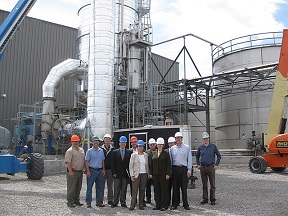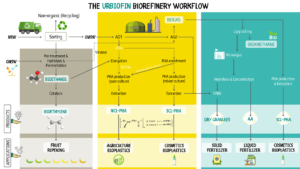Urban waste is a serious threat to the sustainability of our cities. Essentially, our economic model, as far as private consumption is concerned, is still once-through. Consumers don’t care very much about the ‘end phase’ of their products; and waste treatment is still in a nascent phase. Now, the European URBIOFIN project developed an urban biorefinery for treatment of the organic fraction of municipal solid waste.

The URBIOFIN website tells us that in contemporary Europe, each citizen generates an average of 0.5 tonnes of municipal solid waste (MSW) per year. Around 40-50% of this is organic waste. This mainly consists of carbohydrates, proteins and lipids. These are all useful raw materials that can be converted to valuable products. If we would succeed in valorizing this fraction in an urban biorefinery, we wouldn’t just help to solve environmental pollution, but also help to end the once-through economy.
Not an easy task
So far, our main valorizing technologies were digestion and composting. These served to reduce the biodegradable fraction of solid waste sent to landfill; but their products (biogas and compost) didn’t represent much value. Therefore, municipalities didn’t have much incentive to deploy them. Therefore, the URBIOFIN project set as its goal to develop an economically attractive urban biorefinery; at first at a semi-industrial scale (10 T/day). This resulted in a process producing valuable products for various markets like agriculture and cosmetics. More precisely: chemical building blocks (bioethanol, volatile fatty acids, biogas), biopolymers (polyhydroyalkanoates and biocomposites) and additives (bioethylene, microalgae hydrolisated for biofertilisers). According to the recent URBIOFIN press release, the technology is ready to be implemented Europe-wide.

European legislation calls for the organic fraction of municipal waste to be treated by novel treatment methods, based on green technologies. Therefore, the URBIOFIN project mission was to demonstrate the techno-economic and environmental viability of an integrated urban biorefinery. This resulted in quite complicated process scheme with many steps (see image). With many products, like bioethanol, biogas, volatile fatty acids and medium-chain fatty acids, and high added-value products such as bioethylene, bioplastics and biofertilisers.
The urban biorefinery
Many companies and research institutes were involved in the development of these technologies. The project was coordinated by PERSEO Biotechnology in Valencia, Spain. Other organizations participating were:
Industry: URBASER S.A., BIOMASA PENINSULAR S.A., Novozymes A/S, NATUREPLAST SAS, NATRUE AISBL, IRIS Technology Solutions S.L., Leygatech SAS, ETAM SA
Research Organisations: ainia, Wageningen University & Bioresearch, Centro de Investigaciones Energéticas Medioambientales y Tecnológicas, IRIAF (CLAMBER Biorefinery), Consejo Superior de Investigaciones Científicas
Universities: University of Valladolid
According to the press release, this urban biorefinery concept can be applied both in its entirety or in part. In both cases, these technologies would make a major contribution to urban waste management.
Interesting? Then also read:
Food loss and waste to be reduced by better management and new technologies
The role of chemistry in the reduction of plastic waste
Multiple use of biomass
